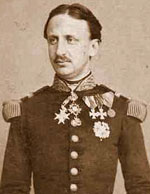Frans II af begge Sicilier

Konge af begge Sicilier 1859-61. Søn af Ferdinand II, var en svag, ubegavet mand, et bytte for hoffet. Uden at tage versel af begivenhederne i Nord-Italien 1859, fortsatte han det gamle spion- og politisystem. 1860 landede Garibaldi med sine skarer på Sicilien, som dermed gik tabt. Frans slog nu om og genoprettede forfatningen af 1848, men det var for sent. I august samme år kom Garibaldi til fastlandet, og Frans måtte flygte og udholde en lang indeslutning i Gaeta (september 1860-februar 1861). Da alt var tabt, drog Frans til Rom, og da alt håb om at genvinde landet glippede, 1869 til Bayern. Frans var gift med Marie, datter af Maximilian af Bayern og søster til den østrigske kejserinde Elisabeth. (HK4/1922)
- Calatafimi, 1860
- Milazzo, 1860
- Castelfidardo, 1860
- Gaeta, 1860-61
King of the Two Sicilies, son of Ferdinand II. and Maria Cristina of Savoy, was the last of the Bourbon kings of Naples. His education had been much neglected and he proved a man of weak character, greatly influenced by his stepmother Maria Theresa of Austria, by the priests, and by the Camarilla,’ or’ reactionary court set. He ascended the throne on the death of his father (22nd of May x859). As prime minister he at once appointed Carlo Filangieri, who, realizing the importance of’ the Franco-Piedmontese victories in Lombardy, advised Francis to accept the alliance with Piedmont proposed by Cavour. On the 7th of June a -part of the Swiss Guard mutinied, and while the king mollified them by promising to redress their grievances, General Nunziante collected’ other troops, who surrounded the mutineers and shot them ‘down. The incident resulted in the disbanding of the whole Swiss Guard, the strongest bulwark of the dynasty. Cavour again proposed an alliance to divide the papal ‘states between Piedmont and Naples, the province of Rome excepted, but Francis rejected an idea which to him savofired of sacrilege. Filangieri strongly advocated a ‘Constituti6n ~s’the only measure which might save’ the dynasty, and on the ~king’s refusal he resigned.: Meanwhile the revolutionary parties were conspiring for the overthrow of’ the Bourbons in Calabria and Sicily, and Garibaldi was’preparing for a raid in the south. ‘A conspiracy in Sicily was discovered and the plotters punished with brutal severity, but Rosalino PiI6 and Francesco Crispi had organized the movement, and when Garibaldi landed, at Marsala (May 186o) lie conquered the island with astonishing ease. These events at last frightened Francis into granting a constitution, but its promulgation was followed by disorders in Naples and the resignation of ministers, and Liborio Romano became head of the government. The disintegration of the army and navy proceeded apace, and Cavour sent a Piedmontese squadron carrying troops on board to watch events. Garibaldi, who had crossed ,the straits of Messina, was advancing northwards and was everywhere received by the people as a liberator. Francis, after long hesitations and even an appeal to Garibaldi himself, left Naples (6th of September) with his wife Maria Sophia, the court, the diplomatic corps (the French and English ministers excepted), and went by sea to Gaeta, where a’ large part’ of the army was concentrated. The next day Garibaldi entered Naples, was enthusiastically welcomed, and formed a provisional government. King Victor Emmanuel had decided on the invasion of the papal states, and after occupying Romagna and the Marche entered the Neapolitan kingdom. Garibaldi’s troops defeated the Neapolitan royalists on the Volturno (1st and 2nd of October), while the Piedmontese captured Capua. Only Gaeta, Messina, and Civit~lla del Tronto still held out, and the siege of the former by the Piedmontese began on the 6th of November i86o. Both Francis and Maria Sophia behaved with great coolness and courage, and even when the French fleet, whose presence had hitherto prevented an attack by sea, was withdrawn, they still resisted; it was not until the 12th of February I86i that the fortress capitulated. Thus the kingdom of Naples was incorporated in that of Italy, and the royal pair from that time forth led a wandering ‘life in Austria, France and Bavaria. Francis died on the 27th of December 1894 at Arco in Tirol. His widow survived him.
Francis II. was weak-minded, stupid and vacillating, but, although his short reign was stained with some cruel massacres and persecutions, he was less of a tyrant than his father. The courage and dignity he displayed during his reverses inspired pity and respect. But the fact that he protected brigandage in his former dominions and countenanced the most abominable crimes in the name of legitimism greatly diminished the sympathy which was felt for the fallen monarch.